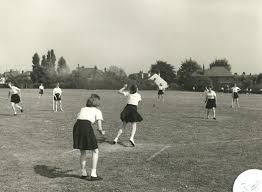Rounders (Reel 9, Box 4B)
Peter Jackson, one of the local Bolton volunteer observers, was sent to observe rounders matches in August 1937.
Ladies rounders was established as a popular game in Bolton before the Great War in elementary schools, sunday schools and weaving sheds and mills. Rounders requires limited equipment, can be played on cricket fields and a hundred years ago had no societal ‘baggage’, nor did it include physical contact – meaning there were no moral arguments against young women playing it or suggestions that it might be unsuitable for fragile female bodies. Moreover, Bolton had an already high proportion of girls and women working in 1914 and these were supplemented by the hundreds of young female munition workers between 1914 and 1918. Finally the temperance lobby, a powerful force in Victorian and Edwardian Bolton had been supporting sports, bands and societies for decades as a bulwark against the lure of the pub and the dubious attractions of the music halls. Working people however were not easily duped and rounders was fun, beside you could play rounders then have a drink and a sing-song!

By 1918 scores of rounders teams were in place and a league was started, run by a sub-committee of Bolton Sports Federation. By the time the Ling association (now the National Educational Association) established a national set of rules, Bolton’s rules were firmly in place and Bolton saw no need to use these johny-cum-lately rules. It has been the same ever since.
Jackson observed two matches.
The first match was on Tuesday 10 August 1937 – Bolton Sunday School Social League. Isaac Pearson’s v Albion Mills at Hatfield Road (probably in Hatfield Park). Medal play off, presumably for the Chadwick cup which was to be played the following day.
Peter Jackson reported on an evening match on a hot day with a stuffy atmosphere, the game taking place closeby a mill – with the smoke and oily atmosphere that implies. In fact the match took place off Chorley Old Road, surrounded by mills. The match started at 7.15 and finished around 9.30. He did not report on the score.
His primary comment was that the small crowd remained enthusiastic through the game whereas the players toward the end looked weary. He pointed out that many of the players would have worked a full shift in a weaving shed or mill and been tired out anyway. He commented that rounders is not conducive to good health, which is promoted by good food, fresh air, coupled with rest as a tonic for cotton mill workers.
What he did not highlight was that the game was a third place play off for teams who would have much preferred playing in the final the following day. So the passion and enthusiasm for this match would have been less in evidence than had they reached the final.
The second match was the final of the prestigious J. W. Chadwick Cup competition on 11 August 1937. This, the highlight of the season, took place at Heaton Cricket Club. Tootal Broadhurst and Lee played Eagley ‘A’ (Eagley Mills was described by Peter Jackson as ‘threadmaker, the biggest in the world, part of Coats’. TBL was a giant of the time, with vertically integrated manufacturing capacity – spinning, weaving and clothing manufacture – across South Lancashire. Bolton’s TBL mill was Sunnyside Mill in Daubhill).
Jackson described an important occasion with the mayoress present and 1000 spectators at the start of the match going up to 1200.
He mentions the play a little, but not in great detail. He does mention being watched by a man he knew as ‘Paddy’. Peter Jackson was unemployed and Paddy worked at the Labour Exchange, obviously recognised him and was suspicious that Jackson, notepad in hand might have been working.

TBL won. The Chadwick cup in the 1930s was dominated by teams from the big mills, TBL, Barlow and Jones for instance and Musgraves.
As an aside there is a brief record in Reel 9, Box 4B of Gertrud Wagner’s trip to Raikes Lane on 30 July 1937 to watch a Baseball Match between Bradford and Bolton Scarlets. Bradford won. Baseball had a brief heyday just before the war: set up by Football Pools companies wanting to make money through the summer when football did not take place. Gertrud was a trained sociologist, an Austrian social democrat who had taken part in the famous Marienthal study of unemployed men in a village near Vienna. She had escaped to Britain a couple of years before. Charles Madge of MO employed her to undertake a formal survey of working people’s attitude to saving. But she also took part in a range of other work, observing this baseball game and All-in-Wrestling. She also conducted interviews for the Food and Shopping survey and took part in ‘long follows’, including one occasion when she ‘followed’ Mrs Mayoh (the Davenport Street housekeeper) to the Market Hall shopping for towels and plates and egg cups.
Dave Burnham for Live from Worktown
Click on the button below to go back to the MO Contents page.
